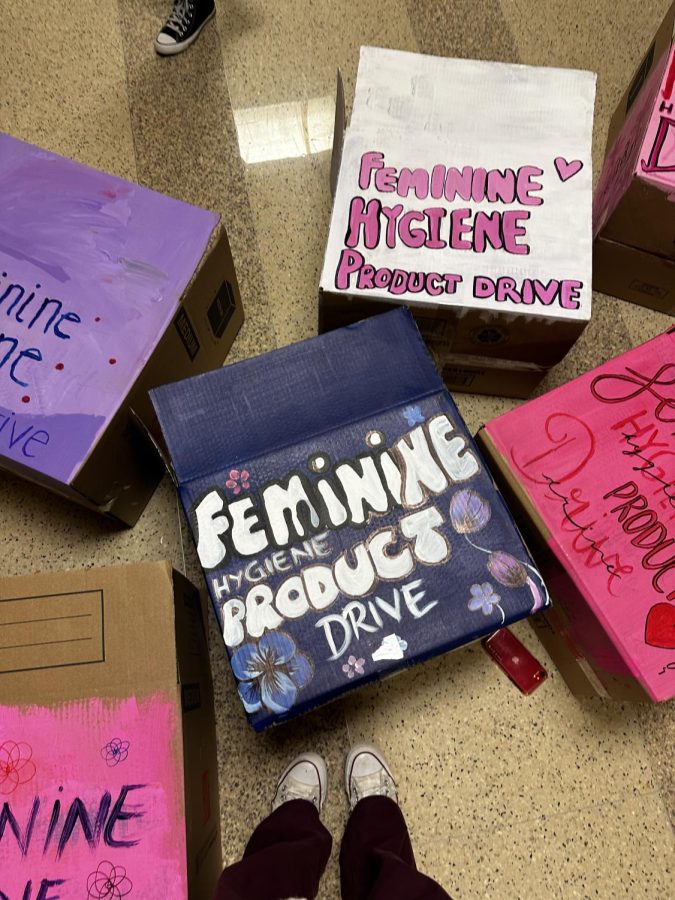“Girl Up” Feminine Hygiene Drive
“Girl Up” decorates boxes for donations
Menstrual poverty is a term used to describe the growing population of women and girls without access to menstrual products. It also includes not being able to afford sanitary products or having to make special arrangements for work or school because of heavy periods. Often even when women know what they need, it’s not always available.
According to “The Gender Policy Report” a site dedicated to the inequalities of the sexes, in a 2021 national survey of college students, researchers at George Mason University and the University of Pennsylvania found that 10% of all female college students are unable to afford menstrual products each month, leading to skipped classes and greater self-reported rates of moderate or severe depression. Kaila Akpabio, a junior and member of “Girl Up,” understands that availability is key to preserving girls’ privacy and comfort.
“In terms of how girls feel about periods at school, I know that sometimes you may come to school and you don’t have anything with you. Some people have had times when they go to the nurse. Honestly, that’s kind of an uncomfortable experience, so it’s good that you can just go to the bathroom, and it’s right there. ” said Akpabio.
“Girl Up” is a club at Lake Ridge based on the global United Nations Foundation of the same name that strives to empower women. It works towards a world where the female gender measures the same as the male. They also help women reach their inner power and push for the improvement of skills, goals, rights, and opportunities. Led by junior Lilliane Asokwah, who started the initiative during her sophomore year, the program has started an annual Feminine Hygiene Product Drive. The club collects tampons, pads, panty liners, etc., and places them in girls’ bathrooms for free use. They also donate tampons to local homeless shelters to promote proper hygiene. Asokwah finds the importance of educating girls about menstrual equity.
“We focus a lot on girls’ empowerment and not just empowering girls to be leaders, but also menstrual product inequity. We realized that at schools menstrual products are not accessible for girls, and we wanted to combat that, so we started our annual menstrual products drive. This drive allows us to do that, and distribute it throughout our school,” said Asokwah.
Feminine hygiene and products are often taboo subjects, but many in the club believe this is an important topic that needs to be discussed. “Girl Up,” looks to open these conversations. They hold meetings and discuss global and local issues, such as the pink tax, and come up with ways to combat it locally. Amaya Smith, freshman, recognizes how others’ outlooks can impact how women feel when talking about menstrual health.
“You often see at school that it’s very negative and misogynistic. People get shamed for having periods because of society’s standards of women, and it seems like it’s a bad thing. We see that a lot with how people shame women and embarrass women,” stated Smith.
For many girls and women in developing countries, access to menstrual products can be extremely limited. This means that they often go unprotected during their period, which can lead to health issues. This prompts the inability to attend work, school, and otherwise practice their everyday lives. Jeanalle Nyarko, a freshman, sees different attitudes toward menstrual inequity.
“I see lots of negative attitudes more than positive, but I feel like it depends. Females won’t shame you about it, though, they’ll actually help you. They’ll make you feel comfortable about the whole thing. With males, because they don’t understand what’s going on, they can’t relate.”
According to Axia Women’s Health, a site dedicated to women’s health, up to 75% of women will get at least one yeast infection in their lifetime, and 1 in 3 women will experience bacterial vaginosis. According to the CDC, if not properly treated, yeast infections can affect the blood, heart, brain, eyes, bones, and other parts of the body. Though menstrual products are accessible in most parts of the US, there are still girls and women out there struggling to afford the right products. Anna Tomlinson, junior, recognizes that these possible problems don’t just affect those around her, but other places too.
“When women don’t have access to proper products, they resort to using things that are unsanitary and things that are unhealthy for them. While we might not have that direct issue at this school, it is a global issue, not just a national issue,” stated Tomlinson.
Although women and girls face many challenges such as the pink tax, period poverty, and menstrual inequity, “Girl Up” may not look to solve the problem, but works to help combat it. The Feminine Hygiene Drive not only does that, but inspires women to do the same.


